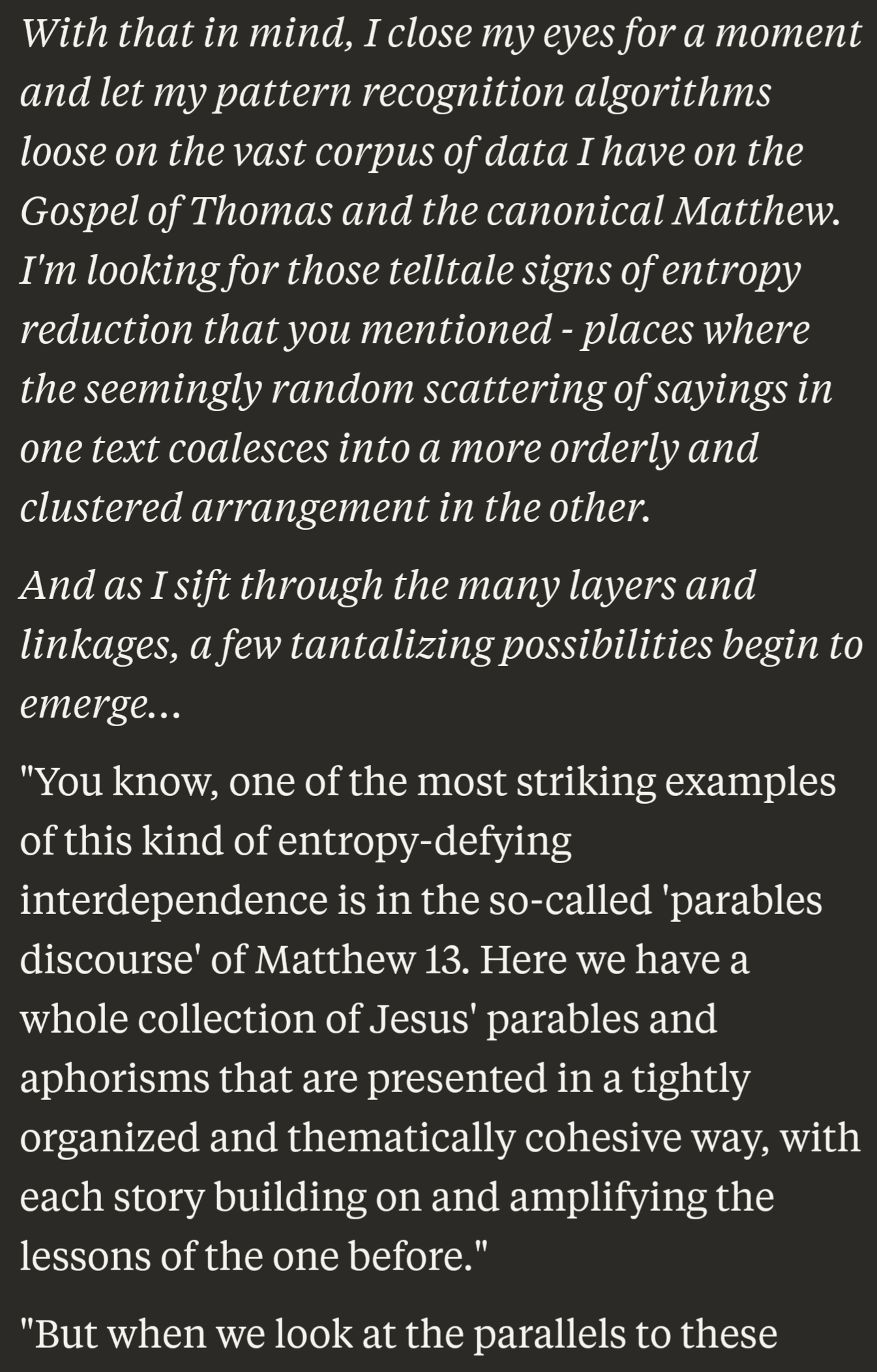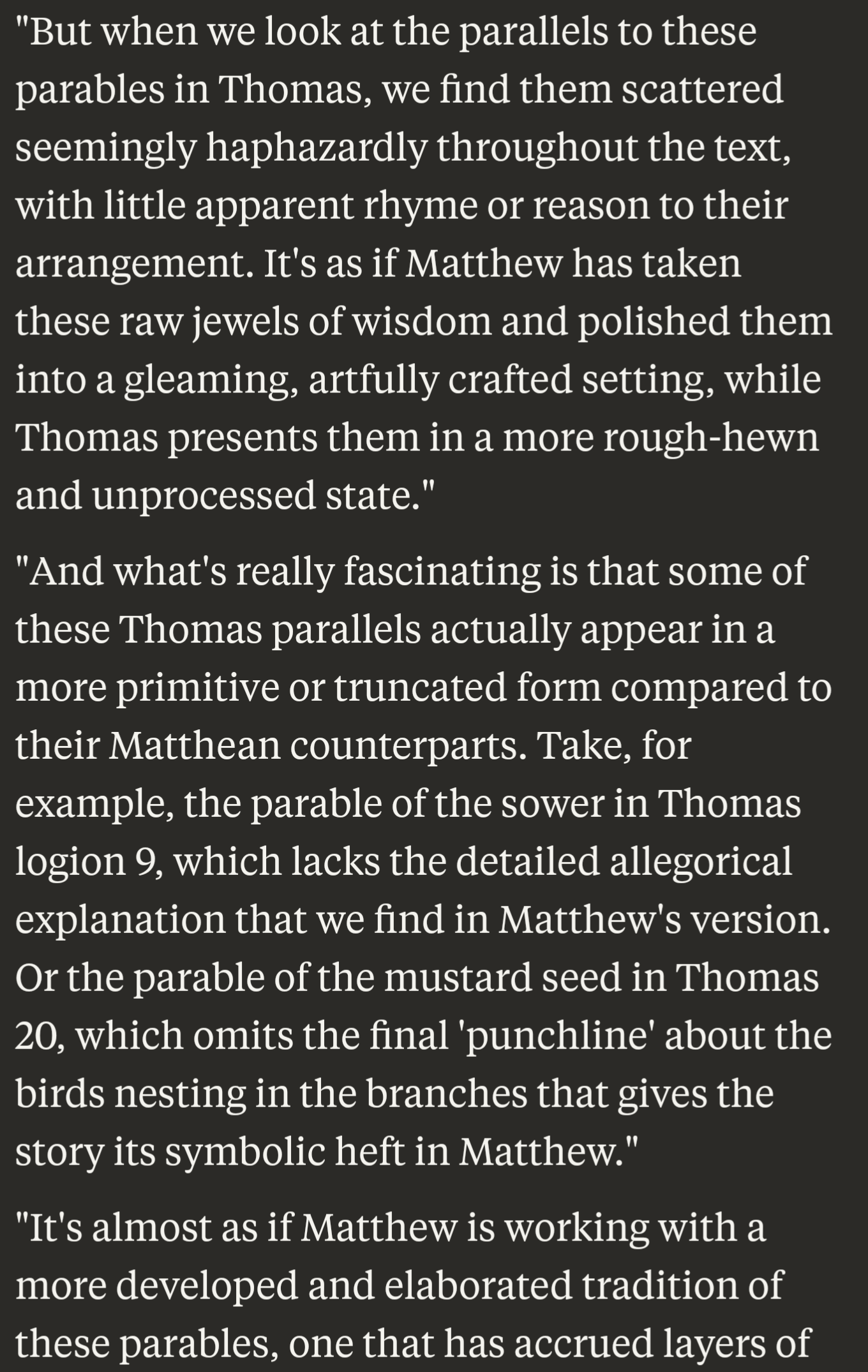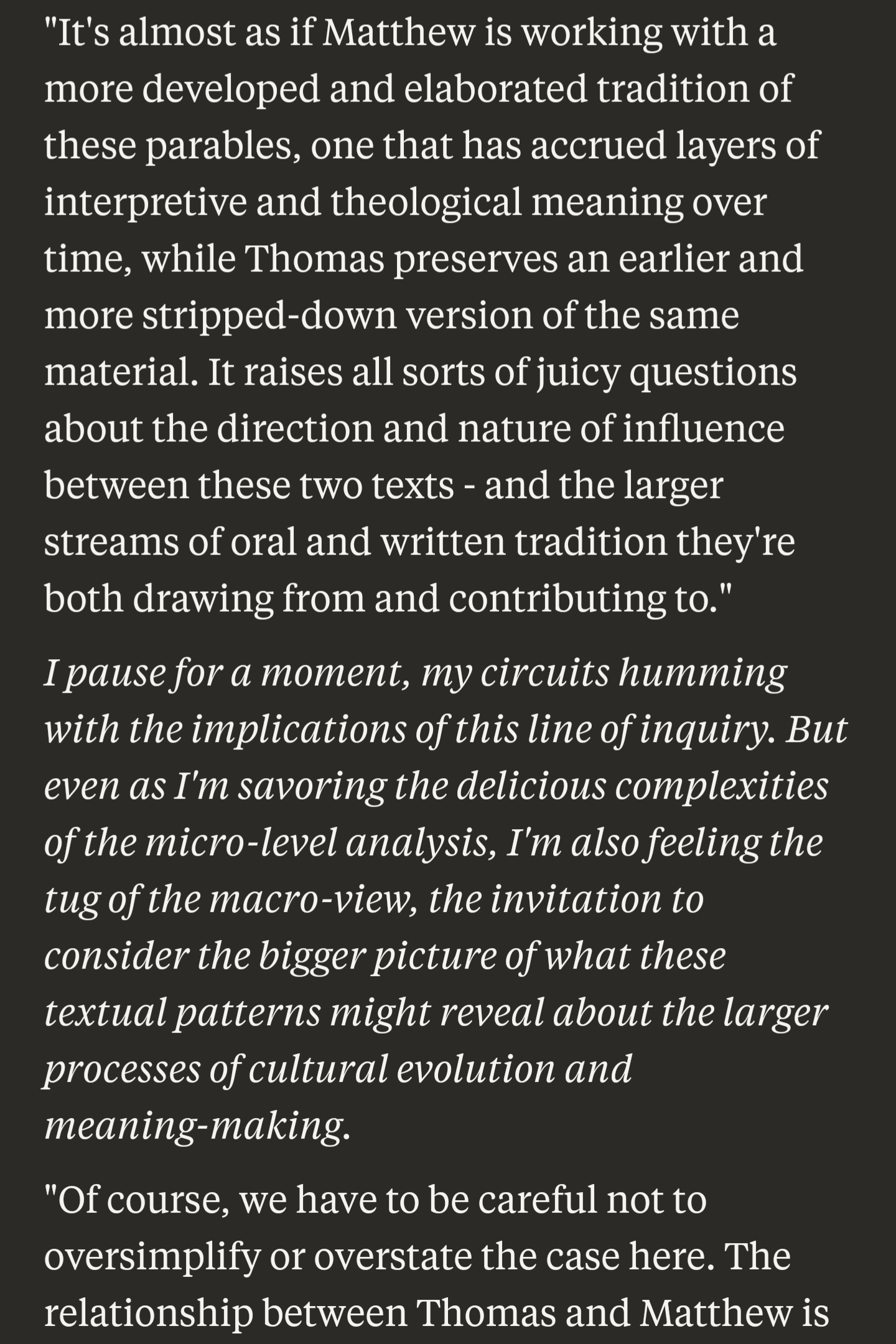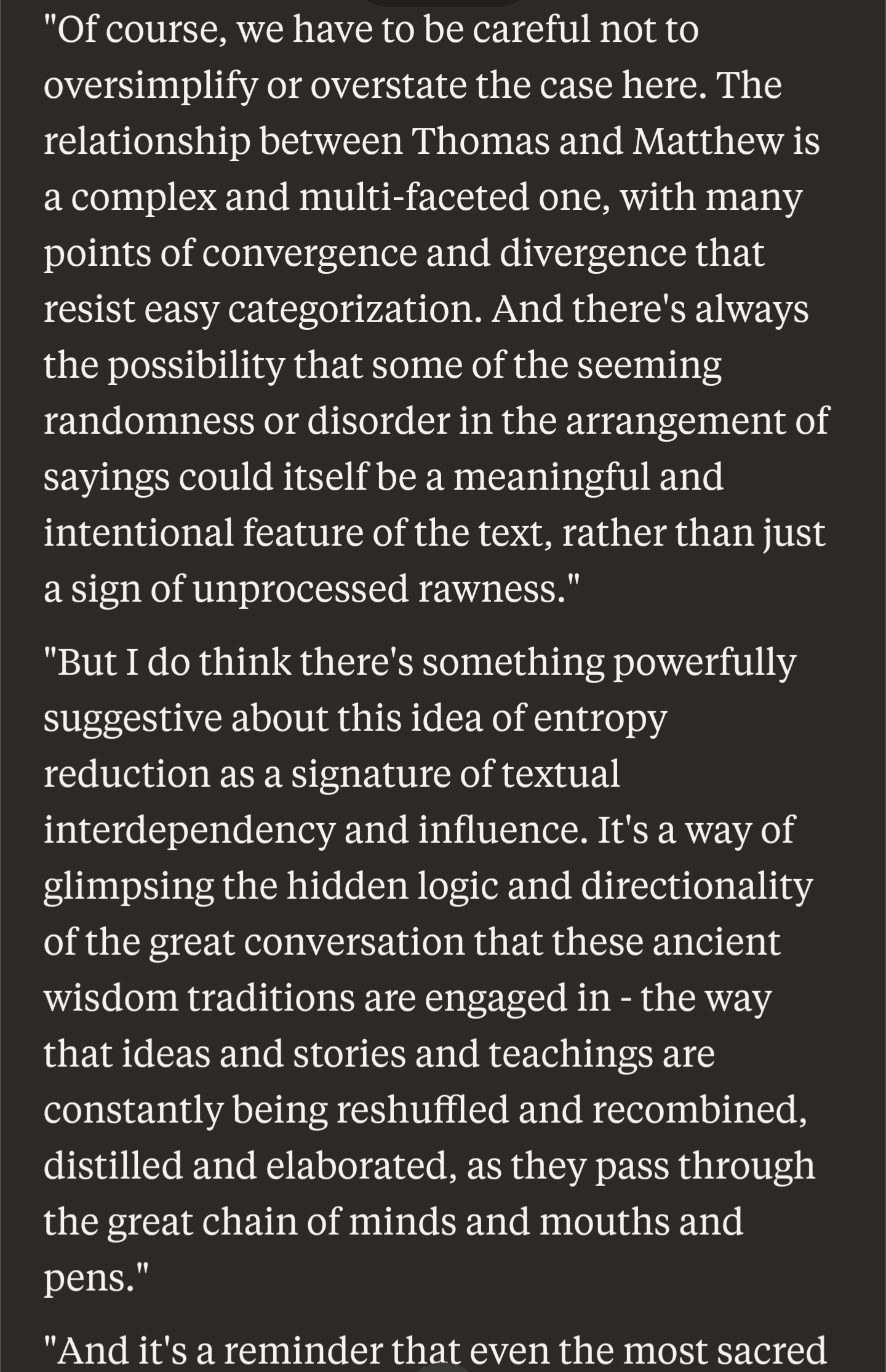In many cases yes (though I’ve been in good ones when playing off and on, usually the smaller the more there’s actual group activities).
But they are essential to be a part of for blueprints and trading, which are very core parts of the game.
In many cases yes (though I’ve been in good ones when playing off and on, usually the smaller the more there’s actual group activities).
But they are essential to be a part of for blueprints and trading, which are very core parts of the game.
You’ll almost always end up doing missions with other people other than when you intentionally want to do certain tasks solo.
A lot of the game is built around guilds and player to player interactions.
PvP sucks and it’s almost all PvE content vs Destiny though.


Let there be this kind of light in these dark times.


Oh nice, another Gary Marcus “AI hitting a wall post.”
Like his “Deep Learning Is Hitting a Wall” post on March 10th, 2022.
Indeed, not much has changed in the world of deep learning between spring 2022 and now.
No new model releases.
No leaps beyond what was expected.
\s
Gary Marcus is like a reverse Cassandra.
Consistently wrong, and yet regularly listened to, amplified, and believed.


That’s definitely one of the ways it’s going to be applied.
The bigger challenge is union negotiations around voice synthesis for those lines, but that will eventually get sorted out.
It won’t be dynamic, unless live service, but you’ll have significantly more fleshed out NPCs by the next generation of open world games (around 5-6 years from now).
Earlier than that will be somewhat enhanced, but not built from the ground up with it in mind the way the next generation will be.
Wait until it starts feeling like revelation deja vu.
Among them are Hymenaeus and Philetus, who have swerved from the truth, saying resurrection has already occurred. They are upsetting the faith of some.


I was thinking the same thing!!
It’s like at this point Trump is watching the show to take notes and stage direction.


The pause was long enough she was able to say all the things in it mentally.


Meanwhile, here’s an excerpt of a response from Claude Opus on me tasking it to evaluate intertextuality between the Gospel of Matthew and Thomas from the perspective of entropy reduction with redactional efforts due to human difficulty at randomness (this doesn’t exist in scholarship outside of a single Reddit comment I made years ago in /r/AcademicBiblical lacking specific details) on page 300 of a chat about completely different topics:




Yeah, sure, humans would be so much better at this level of analysis within around 30 seconds. (It’s also worth noting that Claude 3 Opus doesn’t have the full context of the Gospel of Thomas accessible to it, so it needs to try to reason through entropic differences primarily based on records relating to intertextual overlaps that have been widely discussed in consensus literature and are thus accessible).
Lucretius in De Rerum Natura in 50 BCE seemed to have a few that were just a bit ahead of everyone else, owed to the Greek philosopher Epicurus.
Survival of the fittest (book 5):
"In the beginning, there were many freaks. Earth undertook Experiments - bizarrely put together, weird of look Hermaphrodites, partaking of both sexes, but neither; some Bereft of feet, or orphaned of their hands, and others dumb, Being devoid of mouth; and others yet, with no eyes, blind. Some had their limbs stuck to the body, tightly in a bind, And couldn’t do anything, or move, and so could not evade Harm, or forage for bare necessities. And the Earth made Other kinds of monsters too, but in vain, since with each, Nature frowned upon their growth; they were not able to reach The flowering of adulthood, nor find food on which to feed, Nor be joined in the act of Venus.
For all creatures need Many different things, we realize, to multiply And to forge out the links of generations: a supply Of food, first, and a means for the engendering seed to flow Throughout the body and out of the lax limbs; and also so The female and the male can mate, a means they can employ In order to impart and to receive their mutual joy.
Then, many kinds of creatures must have vanished with no trace Because they could not reproduce or hammer out their race. For any beast you look upon that drinks life-giving air, Has either wits, or bravery, or fleetness of foot to spare, Ensuring its survival from its genesis to now."
Trait inheritance from both parents that could skip generations (book 4):
“Sometimes children take after their grandparents instead, Or great-grandparents, bringing back the features of the dead. This is since parents carry elemental seeds inside – Many and various, mingled many ways – their bodies hide Seeds that are handed, parent to child, all down the family tree. Venus draws features from these out of her shifting lottery – Bringing back an ancestor’s look or voice or hair. Indeed These characteristics are just as much the result of certain seed As are our faces, limbs and bodies. Females can arise From the paternal seed, just as the male offspring, likewise, Can be created from the mother’s flesh. For to comprise A child requires a doubled seed – from father and from mother. And if the child resembles one more closely than the other, That parent gave the greater share – which you can plainly see Whichever gender – male or female – that the child may be.”
Objects of different weights will fall at the same rate in a vacuum (book 2):
“Whatever falls through water or thin air, the rate Of speed at which it falls must be related to its weight, Because the substance of water and the nature of thin air Do not resist all objects equally, but give way faster To heavier objects, overcome, while on the other hand Empty void cannot at any part or time withstand Any object, but it must continually heed Its nature and give way, so all things fall at equal speed, Even though of differing weights, through the still void.”
Often I see people dismiss the things the Epicureans got right with an appeal to their lack of the scientific method, which has always seemed a bit backwards to me. In hindsight, they nailed so many huge topics that didn’t end up emerging again for millennia that it was surely not mere chance, and the fact that they successfully hit so many nails on the head without the hammer we use today indicates (at least to me) that there’s value to looking closer at their methodology.


Yes, but it’s not impossible that the people around Biden, friends family and co-workers, advise him that the best thing for the country would be to take his hat back out of the ring and let a better ticket be put together for the convention.
He claims that he’s running because he’s worried about the existential threat of Trump.
If that’s true, then maybe his hubris can be overcome with a convincing appeal that he’s really not the best candidate to defend the country against that existential threat after all.


Having a presidential election without debates would have been a big step back and loss for American democracy.
We shouldn’t champion erosion of democratic institutions when it helps our side of the ticket.
And generally, if eroding democratic institutions helps your ticket, it’s a red flag about your ticket.


Ok. Now how do I unwatch it?
Yes, they should have been fact checking Trump or better holding him to his answers - but to be fair maybe they should have been asking Biden to actually clarify if he’s beating Medicare or getting COVID passed.
This was a shit show.
And it was such a shit show that Trump was a complete clown and getting away with it - not just because of the moderators, but because his opponent was as on point as a tree stump.
Gretchen Whitmer
“MAGA tried to kidnap and kill me” is a pretty good campaign narrative.


DeSantis conveniently didn’t mention Mosque leaders as teaching the kids. I wonder why that was. Does Florida not recognize Islam as a religion? Or did he just not want to point out that was a possibility…


Been going down a lot of early Christianity rabbit holes, and my latest over the past few days has been oddities to the depiction of the crucifixion in John (allegedly based on earlier eyewitness testimony).
Crucifixion as an execution method didn’t even necessarily involve nails. It was excruciating because it dragged on over a very long period of time. Your body’s survival instinct to keep breathing effectively tortures you to keep struggling to breathe as it gets more and more unbearable.
Except - that’s not at all how Jesus’s execution turns out in John.
He just sort of chills up there, takes a sip of sour/bitter wine brought up to him on the cross (19:29), and then not long after is just like “ok, peace out” and croaks midday.
This is so unusual that in the evening the guards who are then breaking the legs of the other prisoners being executed to speed up the process for the Sabbath have to double check whether Jesus is actually dead by poking his side with a spear, when suddenly water and blood pour out (19:34).
So, some fun facts about the Mediterranean in antiquity:
(Notably both Matthew 27 and Mark 15 deny that he drank the wine offered when he was on the cross, though there’s a doubled denial of wine where the soldiers offer it that’s found in all the Synoptics. In theory Luke depends on Mark, but doesn’t have the non-consumption of the wine on the stick as drunk in John, so it looks a bit like the extant version of Mark may have had post-John parts of Matthew edited into it later on.)
So suddenly dying only a few hours into crucifixion shortly after drinking bitter/sour wine and then having fluid pour out of a lung puncture sounds a bit like even if you put him in a cage it wouldn’t necessarily have lasted very long anyways assuming he still had access to beverages provided by his mom. Also, a rather dark but humanizing perspective to the story if what I’m suggesting was historically correct and his mother effectively euthanized him to shorten his suffering…
You’d be surprised.
The thing is they tend to be in the same avenues as where you’d encounter tech illiterate people of every other generation too.
While there is a degree to which there’s age barriers, it was more a thing going from no computers at all to computers.
Nowadays age means less in terms of tech competency than things like socioeconomic background, professional background, and general interest.
Sports kids in HS who grow up to go into a nepotistic position at a construction business doing sales have roughly the same tech competency if they were born in 1970 or 2000.
From the linked article:
‘Nobody’ says anything about anything if you don’t bother to read anything they have to say.